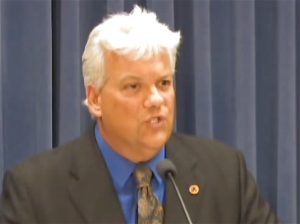‘Part-time’ county pensions a campaign focus across Illinois
By Jean Lotus Staff Reporter — September 6, 2016Pension reform provisions for county commissioners — passed unanimously in Springfield and signed by Gov. Bruce Rauner — are already becoming a campaign issue across Illinois.
State Rep. Jack Franks (D-Marengo) was the chief sponsor of SB 2701, which
gives pension guidelines for “part-time” county board positions. Franks decided not to run for re-election in the General Assembly and is running for Chair of the McHenry County Board.
“This was a collusive practice, a corrupt practice, with a wink and a nod good-ol’ boys who were gaming the system at taxpayer expense,” Franks said in a phone interview. “We are talking about multi-millions of dollars here, across the state.”
A press release issued by Franks’ Springfield office said the time had come for part-time officials to remove themselves from public pensions.
“Local governments should not be spending public dollars on pensions for part-time board members who may not even be eligible for those benefits,” Franks said in a press release. “With the difficult financial challenges facing our local governments, it is time for local officials to tighten their belts, rather than continuing to raise property taxes for their own benefit.”
The new law puts teeth into the requirement that county board members must show they work 600 or 1,000 hours per year — depending on the county — to be eligible for pensions with the Illinois Municipal Retirement Fund (IMRF). That adds up to about 12-20 hours per week, 50 weeks per year.
In Madison County, pensions have already become a hot-button issue. County Board Chairman Alan Dunstan asked board members to withdraw from IMRF. His Republican opponent in the November election, Madison County Treasurer Kurt Prenzler said in a statement that Dunstan was “forced to take action. I would encourage all county board members to vote themselves out of the plan,” Prenzler said.
“Kudos to the General Assembly for passing this bipartisan law unanimously — in Springfield!” Prenzler said. “In our county these pensions have been springboards to other pensions.”
According to the new law, in order to continue to receive an IMRF pension, board members across the state must submit timesheets “documenting the time spent on official government business [including travel] as an elected member of the county board.” Time sheets are considered public records under the Freedom of Information Act.
Winnebago County Board members voted to get rid of their own pensions in 2011. In March of this year, Cook County Commissioner Richard Boykin asked his fellow commissioners to give back their salaries. The motion didn’t fly, but Boykin said he would fund a scholarship with his part-time salary.
In McHenry, a little more than half of county board members (all of them Republicans) are enrolled in the IMRF pension plan. Commissioners earn about $20,000 a year from the county and their pensions are vested after 10 years. Most have health insurance benefits, paid for by the county.
But even before running for board chairman, Franks has made their pensions an issue, even calling in IMRF Director Louis Kosiba to perform an informal audit of the trustees’ pension eligibility. Kosiba found the audit “inconclusive” according to news reports.
Franks’ own pension will begin in 2018 from the General Assembly Retirement System (GARS). According to the Better Government Association Judicial and Legislator pension database, Franks contributed $125,929 to his pension over his 28-year career through 2015. He’ll receive 75 percent of his state-legislator pay of $78,000, or about $58,500 per year.
Even Kosiba himself has had a salary increase over his career at IMRF that will sweeten his pension. According to an article in Forbes Magazine, Kosiba’s salary increased from around $126,700 in 2001 to $242,500 in 2016 – a pay hike of $116,000.
Former legislator Cal Skinner, who runs the McHenry County blog, says he believes Franks is going to have a hard time, if he wins, adjusting from a blustery legislator to an executive official. Skinner received $200 for “campaign work” from the Committee for Michael Walkup, Franks’ Republican opponent.
“A mayor or board chair isn’t going to be throwing bombs, he’s going to be catching bombs,” Skinner said. “You can’t pick which issues come up.”
Skinner said he thinks Franks is “not running for board chair, he’s running for governor.”
But Franks brushed off the criticism saying he “doesn’t look at [party labels].”
“I’ve had an incredibly successful career in the General Assembly because I work well with others,” he said. “If [board members] want to work for the taxpayers instead of themselves, we can be partners.”
— ‘Part-time’ county pensions a campaign focus across Illinois —





